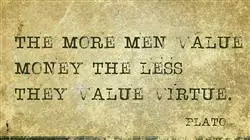University certificate
The world's largest faculty of humanities”
Introduction to the Program
A Postgraduate certificate designed to explain in a clear and irrefutable way the need and importance of teaching philosophy in secondary school classrooms, with an approach that will lead students to understand this subject in a different way"

This program approaches Philosophy from a global , perspective, focusing specifically on teaching. Students can expect to gain a complete body of knowledge of the most fundamental philosophical themes, from the most purely theoretical and metaphysical to the most practical and active human issues.
In today's job market, professionals from other fields who complement their training with master's degrees in thinking and argumentation are highly valued and sought after. The philosopher's ability to see things from a different perspective, to think, as the Anglo-Saxons would say, outside the box, is a fundamental asset in the world of work.
Personally, philosophy helps us to see things, as the great Spinoza said, subaespecie aeternitatis, that is, through a prism of eternity, knowing that in the great context of the world and the universe our actions are both relevant and insignificant.
The role of philosophy as a consolatory discipline before the evils and misfortunes of this world has always been fundamental and, moreover, it allows us to better understand our nature, our actions, our morality, our being. In short, philosophy helps us to grow as people, to mature as individuals, to become more responsible citizens and to improve our work performance.
Throughout the program, students will have the opportunity to access the most important developments in philosophy applied to teaching. Guided by a very complete but very specific syllabus, students will acquire the knowledge and routines required to teach this subject or those applicable to other areas of life.
An opportunity created to add enormous value to students' CV.
A complete and highly effective Postgraduate certificate that will equip you with the most useful tools for teaching philosophy in the secondary school classroom"
This Postgraduate certificate in How and Why to Teach Philosophy offers you the characteristics of a high level scientific, teaching and technological Postgraduate Diploma. These are some of its most notable features:
- The latest technology in online teaching software
- A highly visual teaching system, supported by graphic and schematic contents that are easy to assimilate and understand
- Practical cases presented by practising experts
- State-of-the-art interactive video systems
- Teaching supported by telepractice
- Continuous updating and recycling systems
- Autonomous learning: full compatibility with other occupations
- Practical exercises for self-evaluation and learning verification
- Support groups and educational synergies: questions to the expert, debate and knowledge forums
- Communication with the teacher and individual reflection work
- Content that is accessible from any fixed or portable device with an Internet connection
- Complementary documentation banks permanently available, even after the course
The most powerful online platform in the educational market, which will allow you to use state-of-the-art learning tools"
Our teaching staff is made up of philosophy professionals and active specialists. This way, we ensure that we provide you with up-to-date knowledge, which is what we are aiming for. A multidisciplinary team of trained and experienced professionals who will efficiently develop the theoretical knowledge, but, above all, will put at the service of the Postgraduate Certificate the practical knowledge derived from their own experience: one of the differential qualities of this Postgraduate Diploma.
The effectiveness of our methodological design enhances mastery of the subject matter. Developed by a multidisciplinary team of e-learning experts, it integrates the latest advances in educational technology. In this way, you will be able to study with a range of , comfortable and versatile multimedia tools that will give you the tools you need for your specialization.
The design of this program is based on Problem-Based Learning: an approach that conceives learning as a highly practical process. To achieve this remotely, with the help of an innovative interactive video system, and by means of telepractice and learning from an expert, you will be able to acquire the knowledge as if you were facing the case you are learning at that moment. A concept that will allow you to integrate and fix learning in a more realistic and permanent way.
This Postgraduate certificate, designed for teachers, will allow you to plan the subject in a more effective way with the support of the most developed didactic systems of the moment"

Get training with the world's largest online university and enjoy a high-level educational experience"
Why study at TECH?
TECH is the world’s largest online university. With an impressive catalog of more than 14,000 university programs available in 11 languages, it is positioned as a leader in employability, with a 99% job placement rate. In addition, it relies on an enormous faculty of more than 6,000 professors of the highest international renown.

Study at the world's largest online university and guarantee your professional success. The future starts at TECH”
The world’s best online university according to FORBES
The prestigious Forbes magazine, specialized in business and finance, has highlighted TECH as “the world's best online university” This is what they have recently stated in an article in their digital edition in which they echo the success story of this institution, “thanks to the academic offer it provides, the selection of its teaching staff, and an innovative learning method aimed at educating the professionals of the future”
A revolutionary study method, a cutting-edge faculty and a practical focus: the key to TECH's success.
The most complete study plans on the university scene
TECH offers the most complete study plans on the university scene, with syllabuses that cover fundamental concepts and, at the same time, the main scientific advances in their specific scientific areas. In addition, these programs are continuously being updated to guarantee students the academic vanguard and the most in-demand professional skills. In this way, the university's qualifications provide its graduates with a significant advantage to propel their careers to success.
TECH offers the most comprehensive and intensive study plans on the current university scene.
A world-class teaching staff
TECH's teaching staff is made up of more than 6,000 professors with the highest international recognition. Professors, researchers and top executives of multinational companies, including Isaiah Covington, performance coach of the Boston Celtics; Magda Romanska, principal investigator at Harvard MetaLAB; Ignacio Wistumba, chairman of the department of translational molecular pathology at MD Anderson Cancer Center; and D.W. Pine, creative director of TIME magazine, among others.
Internationally renowned experts, specialized in different branches of Health, Technology, Communication and Business, form part of the TECH faculty.
A unique learning method
TECH is the first university to use Relearning in all its programs. It is the best online learning methodology, accredited with international teaching quality certifications, provided by prestigious educational agencies. In addition, this disruptive educational model is complemented with the “Case Method”, thereby setting up a unique online teaching strategy. Innovative teaching resources are also implemented, including detailed videos, infographics and interactive summaries.
TECH combines Relearning and the Case Method in all its university programs to guarantee excellent theoretical and practical learning, studying whenever and wherever you want.
The world's largest online university
TECH is the world’s largest online university. We are the largest educational institution, with the best and widest online educational catalog, one hundred percent online and covering the vast majority of areas of knowledge. We offer a large selection of our own degrees and accredited online undergraduate and postgraduate degrees. In total, more than 14,000 university degrees, in eleven different languages, make us the largest educational largest in the world.
TECH has the world's most extensive catalog of academic and official programs, available in more than 11 languages.
Google Premier Partner
The American technology giant has awarded TECH the Google Google Premier Partner badge. This award, which is only available to 3% of the world's companies, highlights the efficient, flexible and tailored experience that this university provides to students. The recognition as a Google Premier Partner not only accredits the maximum rigor, performance and investment in TECH's digital infrastructures, but also places this university as one of the world's leading technology companies.
Google has positioned TECH in the top 3% of the world's most important technology companies by awarding it its Google Premier Partner badge.
The official online university of the NBA
TECH is the official online university of the NBA. Thanks to our agreement with the biggest league in basketball, we offer our students exclusive university programs, as well as a wide variety of educational resources focused on the business of the league and other areas of the sports industry. Each program is made up of a uniquely designed syllabus and features exceptional guest hosts: professionals with a distinguished sports background who will offer their expertise on the most relevant topics.
TECH has been selected by the NBA, the world's top basketball league, as its official online university.
The top-rated university by its students
Students have positioned TECH as the world's top-rated university on the main review websites, with a highest rating of 4.9 out of 5, obtained from more than 1,000 reviews. These results consolidate TECH as the benchmark university institution at an international level, reflecting the excellence and positive impact of its educational model.” reflecting the excellence and positive impact of its educational model.”
TECH is the world’s top-rated university by its students.
Leaders in employability
TECH has managed to become the leading university in employability. 99% of its students obtain jobs in the academic field they have studied, within one year of completing any of the university's programs. A similar number achieve immediate career enhancement. All this thanks to a study methodology that bases its effectiveness on the acquisition of practical skills, which are absolutely necessary for professional development.
99% of TECH graduates find a job within a year of completing their studies.
Postgraduate Certificate in How and Why to Teach Philosophy
Philosophy is a key discipline for understanding and reflecting on the world in which we live, so its teaching is fundamental in education. Likewise, it is essential that teachers are highly qualified to transmit the values of this subject effectively, mastering the most efficient academic methodologies. For this reason, TECH has designed the Postgraduate Certificate in Teaching How and Why to Teach Philosophy, oriented towards teachers who wish to acquire the skills and knowledge necessary to teach this subject in a rigorous and motivating way.
Develop yourself as a teacher with this degree
The Postgraduate Certificate in Teaching How and Why to Teach Philosophy is an excellent tool to acquire the best techniques for teaching this discipline in the classroom. During such academic experience, you will get the cutting-edge strategies for teaching philosophy or analyze its relevance and controversial issues at school age. In this way, you will significantly develop your teaching skills through a 100% online methodology and without the need to move from your home.







